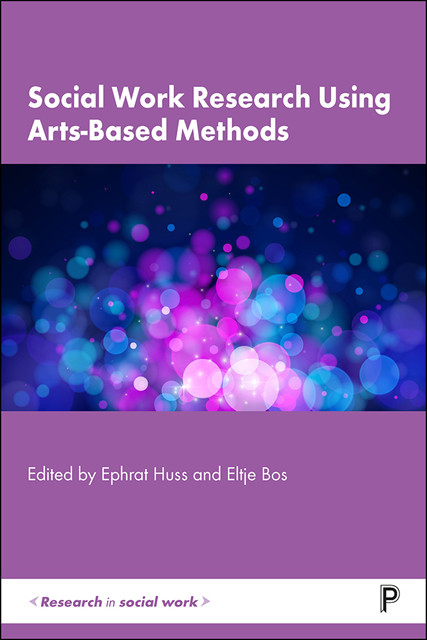Book contents
- Frontmatter
- Dedication
- Contents
- List of figures and tables
- Notes on contributors
- Introduction
- Section I Arts-based research as a method to understand and give voice to marginalised groups
- Section II Using arts-based research to listen to, and give voice to, children in social work
- Section III Arts-based research as a way for researchers and community members to understand communities
- Epilogue
- Index
12 - Forum theatre as participatory action research with community workers
Published online by Cambridge University Press: 13 October 2022
- Frontmatter
- Dedication
- Contents
- List of figures and tables
- Notes on contributors
- Introduction
- Section I Arts-based research as a method to understand and give voice to marginalised groups
- Section II Using arts-based research to listen to, and give voice to, children in social work
- Section III Arts-based research as a way for researchers and community members to understand communities
- Epilogue
- Index
Summary
A new practice: neighbourhood teams
In Amsterdam, just like in 87 % of all municipalities in the Netherlands, integrated neighbourhood teams have been installed as an answer to the reform of the welfare state. During the last decade, the social domain has gone through its strongest change since 1945. Transitions by new national acts and policies have gone hand in hand with decentralisation, which has transferred most responsibilities in the social domain to municipalities, accompanied by less financial means. On the local level, these changes have been translated by municipalities into policies, responsibilities, interventions, and a repertoire that requires strong changes in the professional behaviour of all stakeholders.
One of the newly implemented practices consists of interdisciplinary neighbourhood teams focussed on empowerment of people or families who are dealing with multiple challenges in their lives. Professionals from elder care, youth care, community development, and welfare organisations need to collaborate while they attempt to reconcile various professional perspectives on a specific problematic situation. At the same time, there is a shift for many professionals from solving problems for clients towards empowering the clients to solve problems themselves, based on their own strengths or their network. Most of the structural transitions and implementations might be finished; however, the transformation in professional behaviour following these changes, is just starting to develop.
Despite a series of training courses in various methods, the Amsterdam neighbourhood team professionals strongly felt a need to deepen their experiences with situations in which the contact with a client or family had somehow stagnated. Together with the Amsterdam University of Applied Sciences (AUAS) they developed a form of participatory theatre through which they could – and still can – research critical situations in order to contribute to both practice theory and practice development.
Forum theatre as vehicle for action research
The municipality of Amsterdam asked the research institute of the Faculty of Social Work and Law to help the neighbourhood teams to research their experiences in critical situations. The aim was to increase sharing of knowledge, to develop intervention methods, and to provide tools for situations where contact with a client or family had stagnated. The professionals formulated the following research question: What and how can we learn from unravelling situations in which contact with clients has stagnated?
- Type
- Chapter
- Information
- Social Work Research Using Arts-Based Methods , pp. 139 - 147Publisher: Bristol University PressPrint publication year: 2022



